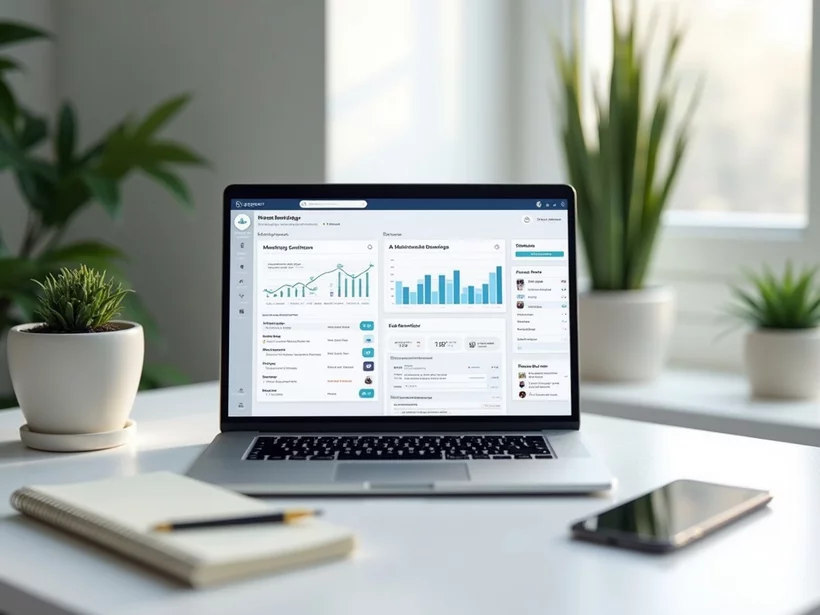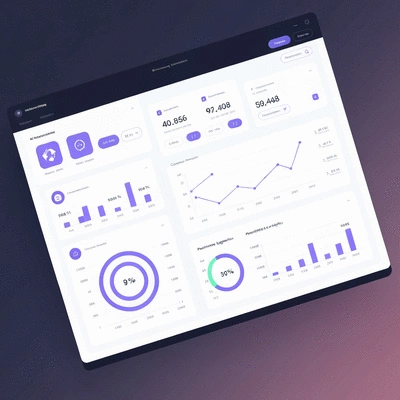AI Marketing Tools for Small Businesses

As the marketing landscape transforms, small businesses are on the brink of a revolutionary change with AI marketing automation. Are you ready to step into the future of marketing and engage with your audience like never before?
What You Will Learn
- AI marketing automation enhances data analysis, enabling businesses to uncover valuable insights from customer data.
- Improved segmentation through AI allows for personalized marketing efforts, increasing customer engagement.
- Predictive analytics helps small businesses anticipate customer needs, driving smarter marketing strategies.
- Marketing automation increases efficiency, allowing teams to focus on higher-level strategic initiatives.
- Automation reduces operational costs, optimizing return on investment for small businesses.
- Consistent messaging across channels is achievable with automation, enhancing brand recognition.
- Understanding data privacy and compliance is crucial for maintaining customer trust in AI-driven marketing.
- Implementing strong security measures is essential to mitigate risks associated with marketing automation tools.
Key Areas of AI Marketing Automation for Small Businesses
AI marketing automation enhances marketing efforts through improved data analysis, segmentation, and predictive capabilities. It also offers increased efficiency, cost savings, and consistent messaging. Below is a comparison of leading platforms, highlighting their primary focus areas. For a deeper dive into how AI can benefit your marketing strategies, read about AI benefits in marketing strategies.
AI's Role in Marketing Automation
Platform Focus: HubSpot
Comprehensive suite: CRM, Email Marketing, Sales, Service.
Platform Focus: ActiveCampaign
Strong email marketing and customer engagement features.
Platform Focus: Klaviyo
Specialized for e-commerce, advanced segmentation.
Platform Focus: EngageBay
Affordable, ideal for scaling small businesses.
Platform Focus: Mailchimp
User-friendly, great for email marketing beginners.
Platform Focus: Salesforce & Zoho
CRM integration for powerful marketing functionalities.
Key Features for Platform Selection
Understanding AI Marketing Automation for Small Businesses in 2025
As we look toward 2025, the landscape of marketing is rapidly evolving, especially for small businesses. The role of AI marketing automation has become a game changer, allowing businesses to streamline their processes and enhance customer engagement like never before. Imagine having tools that not only automate tasks but also provide deep insights into customer behavior—this is where AI steps in!

Through improved segmentation and advanced analytics, AI can help you understand your audience on a granular level. It allows for targeted marketing campaigns that resonate with specific demographics, driving engagement and increasing conversion rates. In short, AI isn't just about automation; it’s about making informed decisions that lead to better marketing outcomes.
The Role of AI in Modern Marketing Automation
AI enhances marketing automation by introducing capabilities that traditional methods simply can’t match. Here are some key benefits:
- Enhanced Data Analysis: AI can process vast amounts of data quickly, identifying patterns and insights that inform your marketing strategies.
- Improved Segmentation: By analyzing customer behavior, AI enables more accurate segmentation, allowing for personalized marketing efforts.
- Predictive Analytics: AI tools can predict future behavior based on historical data, helping small businesses anticipate customer needs.
These features make it easier for small businesses to tailor their marketing strategies effectively. With AI, you can move beyond guesswork and focus on delivering value to your customers. Are you ready to embrace this technology?
Why Small Businesses Need Marketing Automation
For small businesses, the advantages of marketing automation are clear. Here’s why you should consider automating your marketing processes:
- Increased Efficiency: Automating repetitive tasks frees up time for you and your team to focus on higher-level strategies.
- Cost Savings: By streamlining processes, you can reduce operational costs and improve your return on investment.
- Consistency in Messaging: Automation helps ensure that your marketing messages are consistent across all channels, enhancing brand recognition.
As I work with small businesses at AI Marketing Insights, I've seen firsthand how automation allows entrepreneurs to concentrate on growth rather than getting bogged down in day-to-day tasks. Embracing these tools not only enhances efficiency but also positions your business for long-term success. For more insights on how AI tools can streamline your marketing, explore streamlining marketing with AI tools.
Overview of Top AI Marketing Automation Platforms
Now that we've established the importance of AI marketing automation, let's dive into some of the top platforms available. Each offers unique features tailored to meet the needs of small businesses. Here are the key aspects to consider:
Key Features to Look for in Automation Tools
When evaluating AI marketing platforms, pay attention to the following essential features:
- CRM Integration: Look for tools that seamlessly integrate with your existing customer relationship management systems.
- Ease of Use: The platform should have a user-friendly interface that minimizes the learning curve.
- Pricing: Consider the cost relative to the features offered to ensure it fits your budget.
Being selective about the features you prioritize can make a significant difference in your marketing efforts. As I guide clients through this process, I emphasize the need for tools that not only meet their current needs but can also grow with them.
Comparative Analysis of Leading Platforms
Let’s take a look at some leading platforms that can empower your marketing efforts:
HubSpot: An All-in-One Solution for Small Businesses
HubSpot offers a comprehensive suite of tools, from email marketing to CRM. Its pricing is tiered to accommodate small businesses, making it a flexible choice.
ActiveCampaign: A Focus on Email Automation
ActiveCampaign excels in email marketing and customer engagement, providing robust automation features that can significantly boost your outreach efforts.
Klaviyo: Tailored for E-commerce Success
For e-commerce businesses, Klaviyo provides unique offerings, including advanced segmentation and performance tracking tailored to online sales.
EngageBay: Affordable Automation for Growing Businesses
EngageBay is known for its cost-effective solutions, making it ideal for small businesses looking to scale without breaking the bank.
Mailchimp: The Go-To for Beginners in Email Marketing
Mailchimp’s user-friendly features make it perfect for small businesses just starting with email marketing.
Salesforce and Zoho CRM: Integrating Your Marketing Efforts
Both Salesforce and Zoho CRM enhance marketing automation with powerful functionalities, ensuring your marketing efforts are well-integrated.
Emerging Platforms and Niche Alternatives
In addition to the established players, there are emerging platforms worth exploring. Tools like Drip, Ontraport, and Sendinblue offer unique features that cater to specific needs within the marketing automation space.
As we continue to see growth in AI marketing solutions, it’s essential to remain open to new tools that can provide innovative solutions tailored to your business. For an extensive list of tools, check out AI marketing tools for small businesses.
Pro Tip
To maximize the benefits of AI marketing automation, consider starting with a pilot project. Identify a specific area of your marketing that could use enhancement—such as email campaigns or social media engagement. Implement an AI tool in this area and closely monitor the results. This allows you to test the waters and make adjustments before fully integrating AI into your entire marketing strategy.
Frequently Asked Questions About AI Marketing Automation
- What is AI marketing automation?
- AI marketing automation uses artificial intelligence to streamline and enhance marketing processes, such as data analysis, customer segmentation, and personalized communication, to improve efficiency and engagement.
- How does AI benefit small businesses?
- AI helps small businesses by providing enhanced data analysis, improved customer segmentation, predictive analytics for anticipating customer needs, increased efficiency by automating repetitive tasks, and cost savings.
- What features should I look for in an AI marketing platform?
- Key features include strong CRM integration, ease of use with a user-friendly interface, and a pricing model that fits your budget while offering necessary functionalities.
- Is data privacy a concern with AI marketing tools?
- Yes, data privacy and compliance (e.g., GDPR) are crucial. Businesses must obtain explicit customer consent, ensure data access rights, implement secure storage, and maintain transparency in data usage to build trust and avoid legal issues.
- What are some top AI marketing automation platforms for small businesses?
- Leading platforms include HubSpot (all-in-one), ActiveCampaign (email automation), Klaviyo (e-commerce focused), EngageBay (cost-effective), Mailchimp (beginner-friendly email), and CRM-integrated solutions like Salesforce and Zoho.
Addressing Security and Compliance Considerations
As small businesses increasingly leverage AI marketing tools, it’s crucial to consider data privacy and compliance aspects. These factors not only protect your business but also build trust with your customers. Understanding regulations like GDPR is essential for any small business diving into the world of AI.

When utilizing AI tools, you're handling a wealth of customer data. This means you need to ensure that your practices reflect a commitment to data privacy and comply with legal requirements. Companies that fail to prioritize these considerations risk hefty fines and damage to their reputation.
Data Privacy and GDPR Compliance for Small Businesses
Data privacy is more than just a buzzword; it’s a fundamental aspect of maintaining customer relationships. Here are some key points small businesses should consider regarding GDPR compliance:
- Understand Consent: Always obtain explicit consent from customers before collecting their data.
- Data Access Rights: Ensure customers can access their data and request deletion when necessary.
- Secure Storage: Implement strong security measures for data storage to protect against breaches.
- Transparency: Clearly inform customers about how their data will be used and processed.
By focusing on these principles, your business not only adheres to legal standards but also fosters a sense of trust with your audience. As I always tell small business owners: respecting your customers' data is just as important as the marketing strategies you implement.
Managing Security Risks in Marketing Automation
With great technology comes great responsibility! While marketing automation platforms offer impressive capabilities, they can also expose businesses to security risks. Here are some strategies to mitigate those risks:
- Choose Reputable Platforms: Use well-known AI marketing automation tools that prioritize security.
- Regular Updates: Keep your software and systems updated to protect against vulnerabilities.
- Access Controls: Limit access to sensitive data within your team to reduce insider threats.
- Data Encryption: Encrypt data both in transit and at rest to enhance security.
By implementing these practices, you can confidently use marketing automation without compromising your business's security. Remember, at AI Marketing Insights, we believe that combining innovation with security is the key to a successful strategy in today’s competitive landscape.
Recap of Key Points
Here is a quick recap of the important points discussed in the article:
- AI marketing automation is transforming small businesses by streamlining processes and enhancing customer engagement.
- Key benefits of AI include enhanced data analysis, improved segmentation, and predictive analytics.
- Marketing automation increases efficiency, reduces costs, and ensures consistent messaging across channels.
- When choosing automation tools, prioritize CRM integration, ease of use, and pricing relative to features.
- Data privacy and compliance with regulations like GDPR are crucial for maintaining customer trust.
- Mitigating security risks involves selecting reputable platforms and implementing strong data protection measures.








